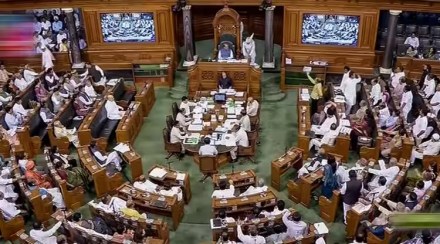In a major step towards building integrated theatre commands, the Lok Sabha has passed the Inter-Services Organisation (Command, Control and Discipline) Bill, 2023.
The bill empowers the Commander-in-Chief and Officer-in-Command of Inter-Services Organisations (ISOs) with all disciplinary and administrative powers in respect of the personnel serving in or attached to such organisations.
On behalf of the Central Government, this Bill empowers the military chief with all the disciplinary and administrative powers in respect of personnel serving in or attached to their Inter-Services Organisations for the maintenance of discipline and proper discharge of their duties, irrespective of the service to which they belong.
The Standing Committee on Defence has approved all the provisions of the bill. The House panel recommended that the bill should be passed without any amendments. The Bill was under the subject of the Standing Committee’s 39th Report in the 17th Lok Sabha.
Currently, the Armed Forces personnel are governed in accordance with the provisions contained in their specific Service Acts – Army Act 1950, Navy Act 1957, and Air Force Act 1950.
According to the statement from the Ministry of Defence (MoD), the enactment of the Bill will have various tangible benefits such as the maintenance of effective discipline in inter-service establishments by the Heads of ISOs, no requirement of reverting personnel under disciplinary proceedings to their parent Service units, expeditious disposal of cases of misdemeanour or indiscipline and saving of public money & time by avoiding multiple proceedings.
While presenting the Bill in the Lok Sabha, Defence Minister Rajnath Singh called it part of a series of military reforms being undertaken by the Government.
“I want to assure the House that this bill is an important step in the direction of military reforms. This bill does not include any additional financial implications,” he said.
“It will also help create an environment that will strengthen discipline in our Inter-Services Organisations, he added.
He described the bill as an important step taken towards integration and jointness among the Armed Forces to face future challenges in an integrated manner.
The MoD with the Department of Military Affairs(DMA) has been initiating a series of measures in line with the concept of integrated theatre command which is underway.
The MoD added that the Bill would also pave the way for much greater integration and jointness amongst the three Services; lay a strong foundation for the creation of Joint Structures in times to come and further improve the functioning of the Armed Forces.
The ‘ISO Bill – 2023’ shall be applicable to all personnel of the Army, Navy, and Air Force, and to persons of other forces as notified by the central government, who are serving in or attached to an Inter-Services Organisation.
The Bill also describes that to maintain Command and Control in the absence of the Commander-in-Chief or the Officer-in-Command, the officiating incumbent or the officer on whom the command develops in the absence of a C-in-C or Oi/C will also be empowered to initiate all disciplinary or administrative actions over the service personnel, appointed, deputed, posted or attached to an Inter-Services organisation.
The Bill empowers the Central Government to constitute an Inter-Services Organisation.
The Bill also has provisions which empower the Commanding Officer of an Inter-Services Organisation to initiate all disciplinary or administrative actions over the personnel appointed, deputed, posted or attached to that Inter-Services Organisation.
Here the Commanding Officer means the officer in actual command of the unit, ship or military establishment.
However, the ‘ISO Bill-2023’ is essentially an Enabling Act and it does not propose any change in the existing Service Acts and Regulations which are time-tested and have withstood judicial scrutiny over the last six decades or more, said the MoD spokesperson.
So, the service personnel when serving in or attached to an Inter-Services Organisation will continue to be governed by their respective Service Acts.
